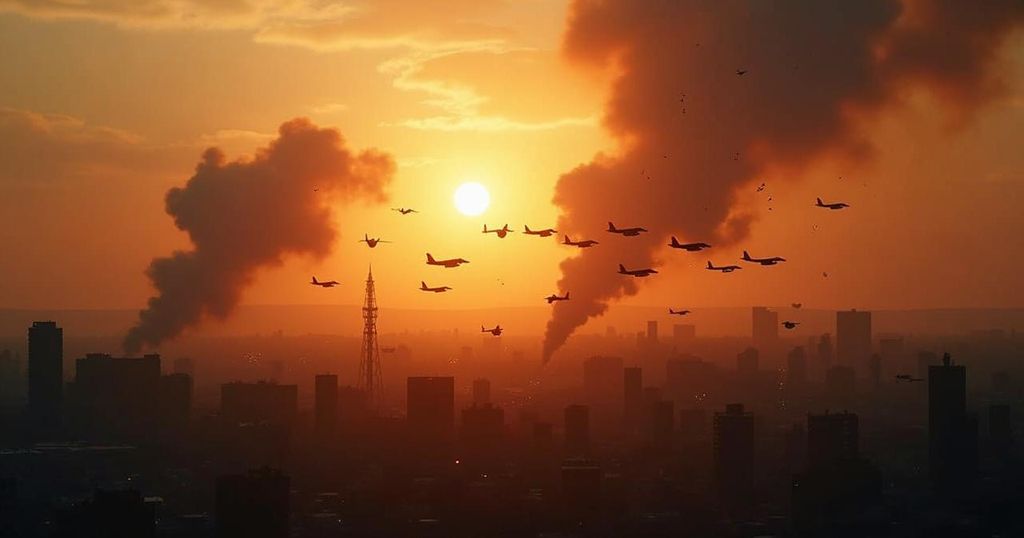Escalating Conflict: Israeli Airstrikes in Beirut and the Broader Impact of the Israel-Gaza War

Israeli airstrikes have targeted Beirut in an extension of military operations against Hezbollah amidst the Israel-Gaza conflict. The actions come after a significant escalation initiated by Hamas. With mounting casualties and a growing humanitarian crisis in Gaza, international calls for arms embargoes on Israel reflect urgent concerns about the ongoing violence.
Overnight, Israeli airstrikes targeted Beirut, with the Israel Defense Forces (IDF) asserting that the operations were aimed at Hezbollah positions. The Lebanese news outlet, Al-Manar, reported significant air assault activities in the southern suburbs of the capital, where flames and large plumes of smoke were visible. The offensive has also expanded to Tripoli, in northern Lebanon, where a Hamas field commander was reportedly killed during the attacks. In light of the ongoing violence, French President Emmanuel Macron has called on nations to cease arms supplies to Israel, emphasizing the need to address the humanitarian concerns stemming from the conflict in Gaza. The backdrop to these airstrikes is a protracted conflict that has ravaged the region for months. The hostilities escalated markedly after October 7, when Hamas initiated a sweeping attack against Israel, resulting in approximately 1,200 fatalities and the abduction of numerous civilians. In retaliation, Israel declared war on Hamas, subsequently initiating a ground invasion that has led to unprecedented displacement in the area since the establishment of Israel in 1948. Significant developments include the assassination of Hamas leader Ismail Haniyeh in July 2024, an act for which Hamas has attributed blame to Israel. Moreover, confrontations between Israel and Hezbollah, an Iran-backed militant group, have intensified over the past year, culminating in increased Israeli military actions within southern Lebanon. These engagements have seen elevated casualty figures, with over 1,400 fatalities, including Hezbollah’s leader, Hasan Nasrallah. The area along the Israel-Lebanon border is historically marked by hostilities, a legacy that extends back to Israel’s founding. In parallel, the situation in Gaza has deteriorated, as Israel conducts one of the most destructive military campaigns of the 21st century, claiming tens of thousands of lives and thrusting a significant portion of the population into dire humanitarian circumstances akin to famine. Israel has faced mounting pressure from its Western allies to facilitate the entry of humanitarian aid into Gaza, yet has largely resisted such appeals. The role of the United States in this conflict remains significant, providing Israel with arms and financial support, even as tensions mount between Prime Minister Benjamin Netanyahu and various U.S. political figures, including President Biden. The U.S. has notably vetoed or abstained from multiple United Nations resolutions seeking a cease-fire. The Israeli-Palestinian conflict is rooted in a complex history of mistrust and animosity that predates the formation of Israel in 1948, reflecting a long-standing struggle over territory and governance that has repeatedly erupted into violence.
This article discusses the recent escalation of military actions in Lebanon as a result of the ongoing Israel-Gaza conflict that began with a major attack by Hamas on Israel in October 2023. Rising tensions between Israel and Hezbollah, backed by Iran, have led to significant military confrontations, characterized by airstrikes resulting in civilian and military casualties, exacerbating the humanitarian crisis in Gaza and raising international concerns regarding arms provisions to Israel. Conclusively, this topic demands an understanding of its historical context, geopolitical ramifications, and humanitarian implications.
In summary, the situation in Beirut and Lebanon represents a critical juncture in the ongoing conflict between Israel, Hamas, and Hezbollah. With airstrikes intensifying and mounting casualties, the humanitarian implications are dire. The calls from global leaders for restraint and cessation of arms supplies underscore the need for a diplomatic solution to prevent further escalation of violence and address the humanitarian crisis in the region. Ultimately, understanding the historical roots of this conflict remains essential in addressing its challenges moving forward.
Original Source: www.washingtonpost.com








